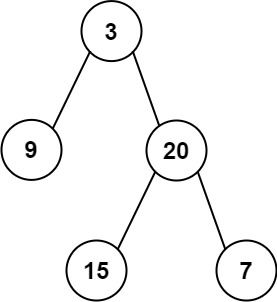Welcome to Subscribe On Youtube
404. Sum of Left Leaves
Description
Given the root of a binary tree, return the sum of all left leaves.
A leaf is a node with no children. A left leaf is a leaf that is the left child of another node.
Example 1:

Input: root = [3,9,20,null,null,15,7] Output: 24 Explanation: There are two left leaves in the binary tree, with values 9 and 15 respectively.
Example 2:
Input: root = [1] Output: 0
Constraints:
- The number of nodes in the tree is in the range
[1, 1000]. -1000 <= Node.val <= 1000
Solutions
-
/** * Definition for a binary tree node. * public class TreeNode { * int val; * TreeNode left; * TreeNode right; * TreeNode(int x) { val = x; } * } */ class Solution { public int sumOfLeftLeaves(TreeNode root) { if (root == null) { return 0; } int res = 0; if (root.left != null && root.left.left == null && root.left.right == null) { res += root.left.val; } res += sumOfLeftLeaves(root.left); res += sumOfLeftLeaves(root.right); return res; } } -
# Definition for a binary tree node. # class TreeNode: # def __init__(self, x): # self.val = x # self.left = None # self.right = None class Solution: def sumOfLeftLeaves(self, root: TreeNode) -> int: if root is None: return 0 res = 0 if root.left and root.left.left is None and root.left.right is None: res += root.left.val res += self.sumOfLeftLeaves(root.left) res += self.sumOfLeftLeaves(root.right) return res -
/** * Definition for a binary tree node. * type TreeNode struct { * Val int * Left *TreeNode * Right *TreeNode * } */ func sumOfLeftLeaves(root *TreeNode) int { if root == nil { return 0 } res := 0 if root.Left != nil && root.Left.Left == nil && root.Left.Right == nil { res += root.Left.Val } res += sumOfLeftLeaves(root.Left) res += sumOfLeftLeaves(root.Right) return res } -
/** * Definition for a binary tree node. * class TreeNode { * val: number * left: TreeNode | null * right: TreeNode | null * constructor(val?: number, left?: TreeNode | null, right?: TreeNode | null) { * this.val = (val===undefined ? 0 : val) * this.left = (left===undefined ? null : left) * this.right = (right===undefined ? null : right) * } * } */ const dfs = (root: TreeNode | null, isLeft: boolean) => { if (!root) { return 0; } const { val, left, right } = root; if (!left && !right) { if (isLeft) { return val; } return 0; } return dfs(left, true) + dfs(right, false); }; function sumOfLeftLeaves(root: TreeNode | null): number { return dfs(root, false); } -
// Definition for a binary tree node. // #[derive(Debug, PartialEq, Eq)] // pub struct TreeNode { // pub val: i32, // pub left: Option<Rc<RefCell<TreeNode>>>, // pub right: Option<Rc<RefCell<TreeNode>>>, // } // // impl TreeNode { // #[inline] // pub fn new(val: i32) -> Self { // TreeNode { // val, // left: None, // right: None // } // } // } use std::rc::Rc; use std::cell::RefCell; impl Solution { fn dfs(root: &Option<Rc<RefCell<TreeNode>>>, is_left: bool) -> i32 { if root.is_none() { return 0; } let node = root.as_ref().unwrap().borrow(); let left = &node.left; let right = &node.right; if left.is_none() && right.is_none() { if is_left { return node.val; } return 0; } Self::dfs(left, true) + Self::dfs(right, false) } pub fn sum_of_left_leaves(root: Option<Rc<RefCell<TreeNode>>>) -> i32 { Self::dfs(&root, false) } } -
/** * Definition for a binary tree node. * struct TreeNode { * int val; * TreeNode *left; * TreeNode *right; * TreeNode() : val(0), left(nullptr), right(nullptr) {} * TreeNode(int x) : val(x), left(nullptr), right(nullptr) {} * TreeNode(int x, TreeNode *left, TreeNode *right) : val(x), left(left), right(right) {} * }; */ class Solution { public: int sumOfLeftLeaves(TreeNode* root) { if (!root) { return 0; } int ans = sumOfLeftLeaves(root->right); if (root->left) { if (!root->left->left && !root->left->right) { ans += root->left->val; } else { ans += sumOfLeftLeaves(root->left); } } return ans; } };